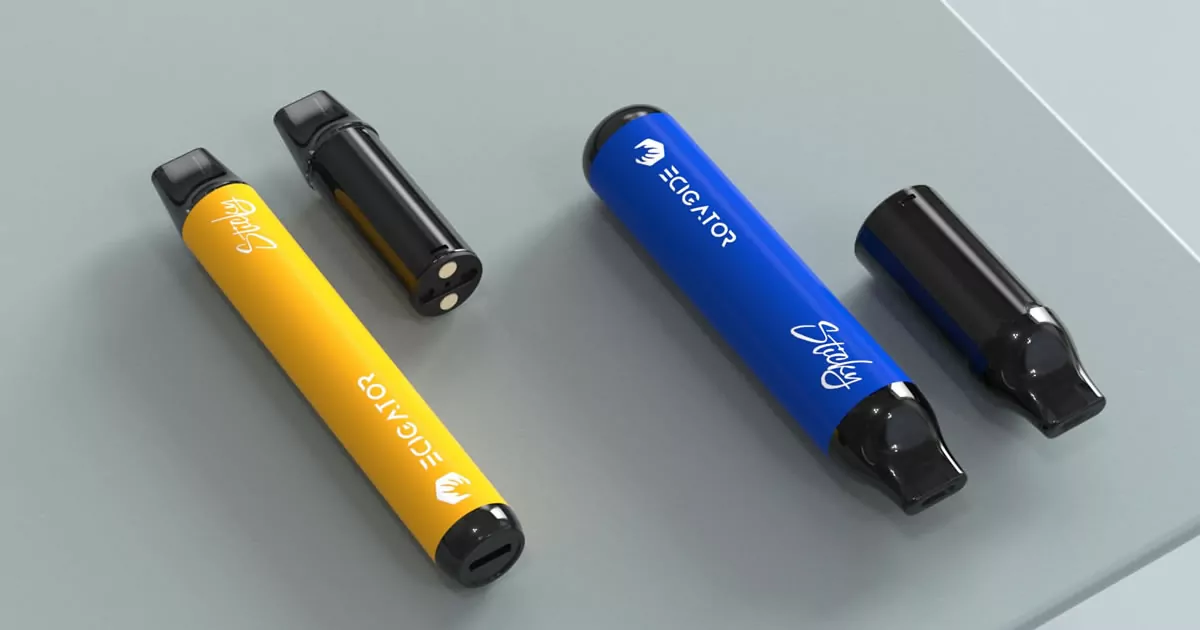Impending UK Ban on Disposable Vapes Sparks Complex Debate
With public pressure mounting, the UK government is poised to prohibit the sale of disposable vapes nationwide. This decisive action aims to tackle escalating concerns over environmental waste and youth vaping addiction. (source)
Vocal advocates from local councils, pediatric groups, and sustainability organizations have urgently lobbied for a ban as disposable vape usage spins out of control. Let’s examine the issues propelling this prohibitive policy shift.
The Meteoric Rise of Disposable Vapes
In just over a decade, disposable vapes catapulted from novelty technology to retail juggernaut. Offering checkpoint convenience with no fussy upkeep, these single-use novelties captivated consumers.
Disposable vapes consist of a pre-filled e-liquid reservoir encased in a plastic chassis with an integrated battery and heating element. After roughly 600 puffs over a few days of use, the battery dies and the device gets discarded.
Initially marketed as a tool for adult smokers to transition from combustible cigarettes, disposables exploded in popularity among youth seduced by candy-like flavors and glossy social media hype.
With prices as low as £5 each and no age verification beyond a store clerk’s glance, disposable vapes soon became an adolescent addiction delivery system. As usage soared in all demographics, calls to ban sales escalated among those witnessing the unfolding public health and environmental mess.
Key UK Disposable Vape Statistics:
- £793.2 million – Disposable sales value in 2022, double from 2021
- 5 million+ – Disposables tossed weekly, up 25% from 2022
- 10+ tonnes – Lithium battery waste from disposables yearly
- 11.6% – UK youth vaping rate in 2023, nearly double 2022’s rate
- 15% – Vaping rate among UK 16-17 year olds currently
As usage exploded in all demographics, calls for sales prohibitions escalated among those witnessing the public health and environmental fallout.
Why a Ban? Perspectives from Concerned UK Voices
In response to public outcry, the UK government now prepares to prohibit disposable vape commerce through legislation. Those advocating for a ban highlight twin crises from disposables’ proliferation:
1. Environmental Waste
Weekly disposable vape waste in the UK jumped 25% in just the past year, reaching an estimated 5 million tossed per week. With no recycling infrastructure, these piles of lithium batteries and plastic get dumped in landfills to slowly leach toxins.
Sustainability groups emphasize proper disposal difficulties, hesitance from retailers to accept e-waste, and the dangers of consumers trying to remove batteries. Simply put, disposable vapes turn into poisonous trash far too easily.
2. Youth Vaping Crisis
Despite age limits, vaping rates among UK youth nearly doubled from 2022 to 2023 as fruity disposables hooked a new generation. With kid-friendly packaging and flavors like bubblegum, corporations notoriously exploit loopholes in vape sales oversight.
Doctors and pediatric groups warn that nicotine risks permanently stunting adolescent brain development. And activists highlight how disposables erase years of anti-smoking progress by renormalizing inhaled tobacco dependence.
Disposable Dilemmas – Perspectives from the Vape Industry
The vaping industry paints a far different picture of disposable vapes, touting positives the ban would erase:
Smoking Cessation
Industry groups argue disposables provide an accessible stepping stone to help adult cigarette smokers quit. Prohibition removes this smoking exit ramp and pushes ex-smokers back to dangerous combustibles.
Economic Benefits
Billions in disposable sales stimulate local economies and small businesses. A ban would eliminate jobs and growth in the retail and service industry.
Illicit Markets
Criminal networks historically exploit banned consumption markets. A disposable ban may spawn unregulated, low-quality, and hazardous black market vape products.
Harm Reduction
Compared to traditional cigarettes, vapes expose users to fewer toxic chemicals. Disposables help mitigate health damage for smokers unable or unwilling to quit nicotine use.
While fair perspectives, most public health experts agree any benefits get eclipsed by the substantial risks from disposable overproliferation.
Overseas Omens – The Global Disposables Reckoning
The UK does not tread into uncharted territory with its planned disposable vape prohibition. Confronting similar mass disposable waste and youth usage, several nations already implemented sales bans:
- Australia
- New Zealand
- Ireland
- Belgium
- France
And in an ironic twist, China – the world’s disposable factory floor – also banned domestic sales amid concerns over addiction and safety. But manufacturing continues as Chinese firms flood foreign markets like the UK with contraband candy vapes.
This global regulatory trend signals disposable vapes face intensifying scrutiny as societies question the ethics of single-use consumption. The UK ban marks a potential tipping point as government reasserts control over industry excess.
The Road Ahead – Life After Disposables
While disposable vapes offer convenience, their profound public health and environmental consequences forced the government’s hand. But where does society go from here?
Possible positive outcomes include:
- Safer reusable vape alternatives gain prominence
- Legislation closes youth sales loopholes
- Tax revenue from licensed vape commerce funds abuse education
- Innovation captures disposables’ simplicity without the waste
Once the policy takes effect, the UK must remain vigilant and address problems proactively if disposable prohibition shifts consumption underground. Only through continued evolution can policy progress endure.
- Minneapolis Sets $25 Minimum Price for E-Cigarettes - July 11, 2025
- Alabama Schools to Implement New Anti-Vaping Policies - July 11, 2025
- Is Vaping and Driving Illegal in Rhode Island? (2025 Guide) - July 10, 2025









